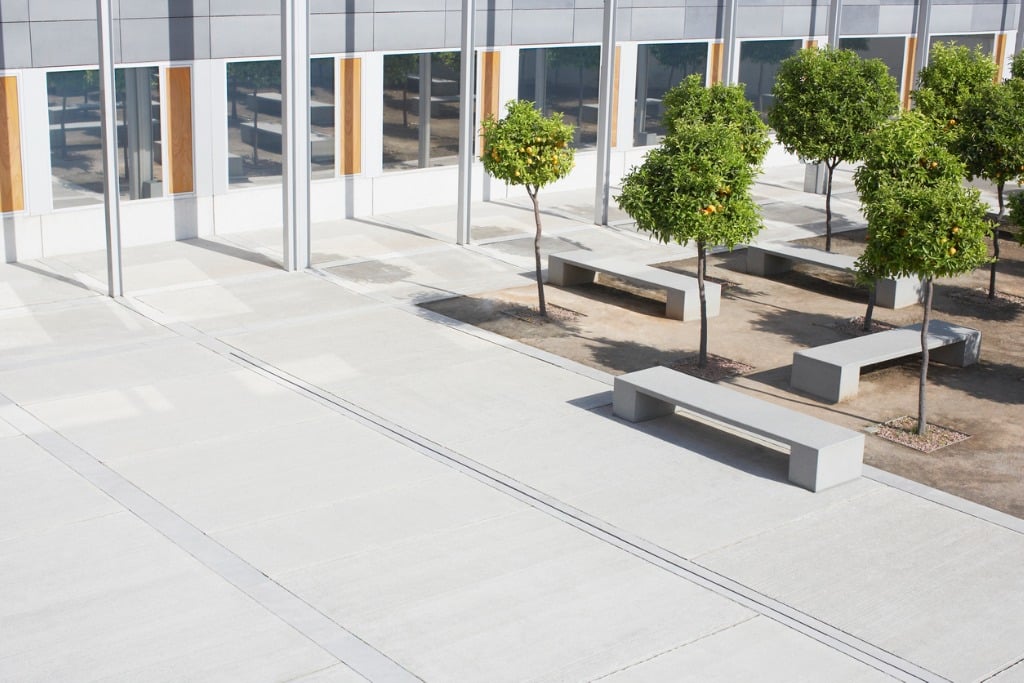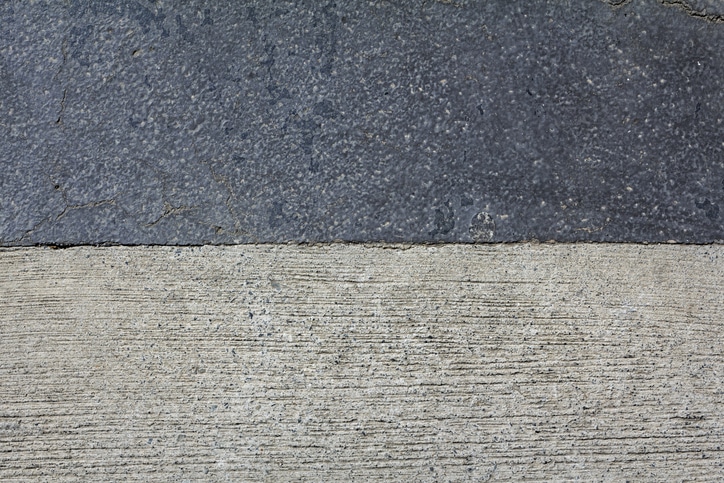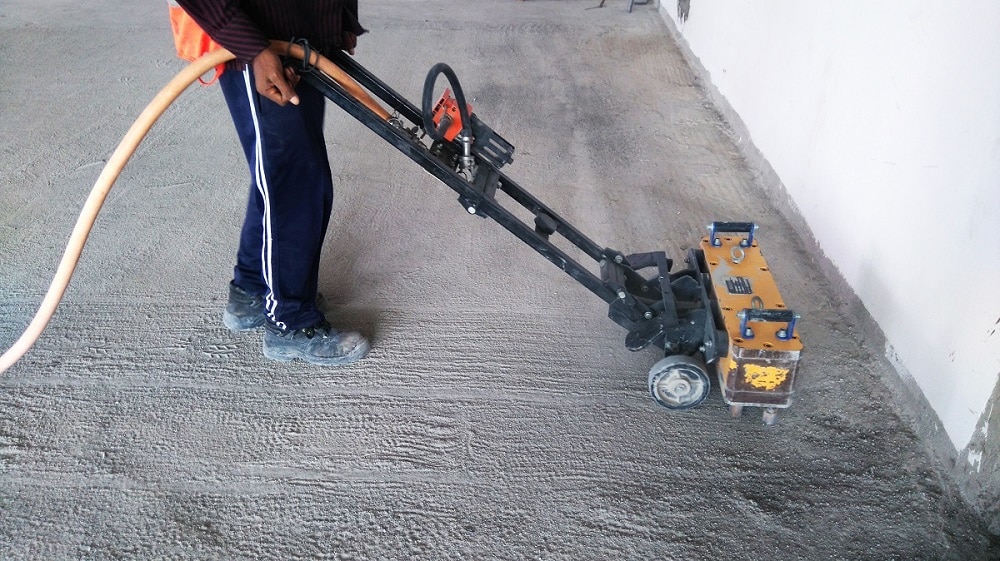Does concrete absorb water? Yes. Because it’s porous, concrete absorbs water. Excessive moisture can lead…

What Is the Difference Between Asphalt and Concrete?
Both asphalt and concrete are common construction materials used for different kinds of construction projects. They deliver unmatched features and benefits for buildings, pools, sidewalks, and parking lots.
In fact, asphalt is the most commonly used material for construction purposes in the U.S., with the industry amassing more than $4B in 2020.
When distinguishing the two, it all boils down to the composition of the materials. Asphalt is a mixture of bitumen (a gummy hydrocarbon of black color sourced from natural deposits or as a byproduct of crude oil) and aggregate. Meanwhile, concrete is a mix of an aggregate and a cement binder that hardens the mixture and gives it that rock-like appearance.
If you aren’t sure which option to choose for your project, continue reading as we elaborate on the main differences between asphalt and concrete. Moreover, we’ll show you where to find the most affordable commercial concrete in Kansas City!
What Makes Asphalt and Concrete What They Are?
Concrete and asphalt take the front and center as the most sought-after building materials. In urban areas, you’ll see asphalt as the primary sidewalk material. However, asphalt is also heavily used for city roads, highways, and so on.
Builders also use concrete for sidewalks and roads. It all comes down to the property owner’s needs and preferences. Both asphalt and concrete sidewalks and parking lots can add fantastic curb appeal. However, the architecture you prefer will determine the final look of the construction materials.
Asphalt
Asphalt is a pitch-black organic petroleum binder used to construct many structures in the building industry. If we break down the basics of asphalt, we’ll find bitumen and aggregate in its composition.
Asphalt is one of the go-to construction materials because it’s versatile and durable. When we first think of asphalt, we instantaneously think of roads. Due to asphalt’s flexibility, cost-efficiency, and ease of use, companies favor this construction material as the ultimate go-to resource.
 The advantages of asphalt include the following.
The advantages of asphalt include the following.
- Budget-friendly
- Versatile
- Flexible
- Non-costly to maintain.
On the other hand, the cons of using asphalt include the following issues.
- Shorter life cycle compared to concrete
- Needs compaction
- Corners and curb ramps are not as accurate
- Requires frequent touch-ups.
Property owners often choose asphalt when paving sidewalks since it’s the most cost-effective solution. It also allows for versatility in use. Moreover, asphalt takes little time to lay down, and soon after, it’s ready to be used.
Construction companies also favor using asphalt since it minimizes downtime after installation. After laying the asphalt down, it won’t take much time for it to set and become readily available for use.
Asphalt surfaces are smoother, which makes walking, running, biking, skating, and driving on asphalt lanes and roads more enjoyable. Plus, asphalt is more difficult to stain due to its natural black color, making this particular construction material a good choice for frequently used surfaces.
However, since asphalt requires more frequent touch-ups, many also choose to go with concrete as an alternative.
Concrete
Some of concrete’s primary uses are more or less the same as with asphalt. Composition-wise, concrete is a mixture of sand, cement, pebbles, pound rocks, and water. Due to the sturdiness of the composition, concrete is the go-to construction material used for massive buildings.
Due to its powerful compressive strength, concrete can withstand massive pressure and superabundant weight. Even though builders primarily use concrete for massive structures, it isn’t uncommon for roads.
The main reason for using concrete for building roads is that it’s far more durable than asphalt and can last longer than other paving materials. That said, raw concrete is highly porous, so it stains easily and reacts heavily to chemicals. However, there are different finishes you can use to shield and enhance the appearance of concrete sidewalks.
The pros of using concrete include the following.
- Exceptionally durable
- Very long-lasting (can last for up to 50 years!)
- Highly versatile
- Fire-resistant
As for the cons, here are some examples.
- It’s somewhat costlier
- It can crack after prolonged use.
It’s also worth mentioning that concrete is the go-to construction material for commercial-grade buildings like shopping malls, medical establishments, museums, schools, corporate facilities, and so on. Because concrete dries 24 to 48 hours after laying it down, this material will be readily available without delaying other construction projects.
Additionally, surface areas heavily used by cars, trucks, and other heavy loads will be best covered in concrete rather than asphalt. This is just one difference between asphalt and concrete that may impact your decision.
You can easily customize concrete to suit different designs. Plus, you can add decorative elements to the concrete as you lay it down, such as pebbles or other embellishing items, and spruce up the industrial look of concrete.
K&E Flatwork: Your Trusted Commercial Concrete Company!
Are you looking to transform your sidewalks or parking lot to go well with the rest of your property? K&E Flatwork will deliver precisely that and more!
With more than 10,000 completed projects, K&E Flatwork is the most trusted commercial concrete paving and repair company in Kansas City, so you have confidence that you’ll receive the best work.
Our team of experienced professionals will offer commercial concrete and concrete paving at the most suitable price for you. Get in touch with us, and leave the heavy lifting to the pros!



